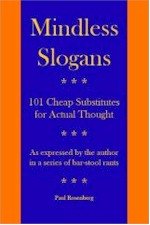 |
|
|
| ||||||
|
|
This page is the original source of this review, though you may also find it on Amazon or other sites. | ||
| Book Reviews Home | Free Audio Books | |
 |
Book Review of: Mindless Slogans101 Cheap Substitutes for Actual Thought Price: $19.90 Availability: Usually ships
within 24 hours |
| Review
of
Mindless Slogans, by Paul Rosenberg (2007) (You can print this review in landscape mode, if you want a hardcopy) Reviewer: Mark Lamendola, author of over 6,000 articles. I have known the author since the late 1990s, and am always interested in what he has to say. His wit and insight have provided me with a great deal of amusement and education over the years. So when he mentioned Mindless Slogans was out, I knew it would be a worthwhile use of my time to read it. Anyone who has known Paul for any length of time knows he is a voracious reader of history, economics, and politics. He's also a prolific writer. Paul is well-known as an author, educator, and speaker in the electrical industry. In electrical work, logic matters and facts are real. Try to play mind games with electricity, and you get burned. Literally. Paul relies on logic and an appreciation for reality, when he presents his well-informed analyses of topics that bear on today's social and political trends. One of those trends is the language abuse that people use in place of thinking. People utter slogans, most of which are false and some of which are absurd, to justify views they have accepted and internalized. When you trace those views back to their source, you find, almost invariably, the person acquired them as a consequence of the relentless brainwashing conducted by predators and parasites. The typical modern-day politician is an example of a brainwashing slogan-spewer. What's the harm in not thinking? After all, thinking is work. In this book, Paul provides some reasons for you to ask that question and find answers that are relevant to your personal situation. The most important point to remember is that people who don't want you to think can (and do) cause you great harm. It is in your own best interests to make your own decisions, and to throw off the chains of mind-neutralizing slogans.
Paul portrays this book as a series of bar-stool rants. He's not one to hang out at bars, so why does he say that? He immediately wants to tell the reader that this isn't a stuffy research piece loaded with references and written with big words where simple ones will do. Yes, there are some references. But generally, he tries to communicate the idea rather than misuse statistics or someone else's flawed research. His approach is to look at each slogan and explain what's wrong with it. And he does that in plain English. This book is full of personal opinions, and you as the reader might not agree with every opinion. I certainly don't. Nor would I expect anyone to agree with all of my opinions. Agreement on every point is never a good metric for deciding whether an author can stimulate you to thinking independently. Rejecting the lunacy that is so adroitly disguised as "common wisdom" is an essential part of being a free and responsible person. You may be surprised at the self-revelation this book causes, but you will be better off for it. | |
About these reviewsYou may be wondering why the reviews here are any different from the hundreds of "reviews" posted online. Notice the quotation marks? I've been reviewing books for sites like Amazon for many years now, and it dismays me that Amazon found it necessary to post a minimum word count for reviews. It further dismays me that it's only 20 words. If that's all you have to say about a book, why bother? And why waste everyone else's time with such drivel? As a reader of such reviews, I feel like I am being told that I do not matter. The flippancy of people who write these terse "reviews" is insulting to the authors also, I would suspect. This sound bite blathering taking the place of any actual communication is increasingly a problem in our mindless, blog-posting Webosphere. Sadly, Google rewards such pointlessness as "content" so we just get more if this inanity. My reviews, contrary to current (non) standards, actually tell you about the book. I always got an "A" on a book review I did as a kid (that's how I remember it anyhow, and it's my story so I'm sticking to it). A book review contains certain elements and has a logical structure. It informs the reader about the book. A book review may also tell the reader whether the reviewer liked it, but revealing a reviewer's personal taste is not necessary for an informative book review. About your reviewer
About reading styleNo, I do not "speed read" through these. That said, I do read at a fast rate. But, in contrast to speed reading, I read everything when I read a book for review. Speed reading is a specialized type of reading that requires skipping text as you go. Using this technique, I've been able to consistently "max out" a speed reading machine at 2080 words per minute with 80% comprehension. This method is great if you are out to show how fast you can read. But I didn't use it in graduate school and I don't use it now. I think it takes the joy out of reading, and that pleasure is a big part of why I read. |
| |||||